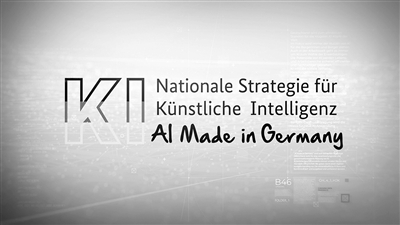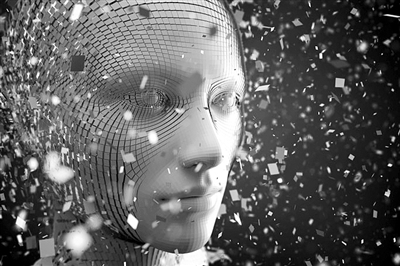

Since the establishment of the German Artificial Intelligence Research Center (DFKI) in 1988, the German government has been funding artificial intelligence research. Image source: German government website
The world tide of scientific and technological innovation ⑦
Our reporter Li Shan
Artificial intelligence (AI) is a core technology in the future and one of the important driving forces of digital transformation. German AI has strong basic research strength and international competitiveness in self-driving cars, but it has lagged behind the countries leading the market in many other application fields. To this end, Germany has taken many measures to catch up, hoping to become a leading place for the development and application of AI technology and embark on a road of AI development different from that of China and the United States.
Increase investment and provide a good environment
In terms of research and development funding for AI, the German government plans to invest 3 billion euros by 2025 to ensure competitiveness on the basis of good research and innovation policies. This guiding role is obvious, and local governments have increased their investment. For example, Lower Saxony decided to invest 17 million euros to expand and develop the branches of the German Artificial Intelligence Research Center (DFKI) in the next five years. In addition, Bosch also announced that it will invest 4 billion euros to develop AI technology by 2021, thus making Bosch an indispensable partner in the field of autonomous driving.
In terms of talent competition, Germany plans to increase at least 100 professorships in the AI field and establish an ambitious young talent program. However, the situation of AI brain drain in Germany is not optimistic. The salaries provided by countries such as China and the United States for AI experts often reach two to three times that of Germany, plus considerable research funding. In the future, Germany will still face the challenge of shortage of relevant talents.
In terms of strengthening the construction of scientific research centers, Germany focuses on continuing to develop and expand DFKI, especially the four centers in Berlin, Munich, Dortmund and Tü bingen. At this year’s Hannover Messe, DFKI showed its own AI research achievements in the public expectation, including version 4.0 of Human-Machine Collaboration (MRK4.0), interpretable AI system, digitalization and Internet of Things in the construction industry, wearable health equipment for the workplace, autonomous robots in space, adaptive interactive teaching and learning systems, and so on. In the next step, Germany will gradually establish a national innovation network consisting of 12 artificial intelligence research centers on the basis of DFKI talents.
Integrating into European Strategy and Developing International Cooperation
Germany is fully aware that a successful AI development strategy needs to cross national boundaries, and it cannot keep pace with the ambitious development plans of enterprises and research institutions in the United States and China on its own. Therefore, Germany organically combines its AI strategy with that of Europe, strengthens coordination and gives full play to the advantages of international cooperation and division of labor. With the strong support of Germany, CERTLAB has grown rapidly since it was launched in the summer of 2018. It has been supported by more than 2,800 European scientists and has built a strong network.
The second is to strengthen German-French cooperation. In January 2019, Germany and France signed the Aachen Treaty, and the two sides will carry out extensive research and innovation cooperation, including establishing a German-French artificial intelligence research and innovation network, formulating ethical standards for new technologies in the field of digitalization and digital society, and reaching common values at the international level. The German Federal Ministry of Education and Research (BMBF) regards the R&D and application of AI as a priority area for future scientific and technological cooperation between Germany and France, and hopes to jointly set up AI research projects, institutional interconnection and jointly create a new framework for AI technology transformation with France.
Once again, it is closely cooperating with Japanese AI research, especially in the field of autonomous driving. In February this year, German Chancellor Angela Merkel visited Japan and reached a consensus with Japanese Prime Minister Shinzo Abe on strengthening cooperation in digitalization and AI between Germany and Japan. On April 16th, Germany and Japan signed a letter of intent to strengthen research cooperation in the field of AI. The German Research Foundation (DFG), the French Research Center (ANR) and the Japan Science and Technology Promotion Agency (JST) jointly funded transnational cooperative research in the AI field, and the first batch of projects will be launched this summer. Germany will also open more AI competence centers to Japan. In the future, Japanese visiting researchers can conduct research in Germany within a certain period of time.
Finally, through international cooperation, Germany hopes to solve its own data source problem. At present, Germany does not have a competitive data platform in the world, and the data information available for AI is scattered among many enterprises. The market model determines that it is difficult for Germany to integrate a large amount of data in the future. On the one hand, Germany needs to solve the problem of data dispersion, break down the "data barrier" and increase the research and development of distributed AI; On the other hand, we have to hope for international cooperation, strengthen data exchange and sharing for machine learning, and provide a massive information foundation for our own development of AI.
Find another way to enhance their competitiveness.
Germany attaches great importance to cultivating the lighthouse effect of AI, actively carries out research in humanities and social sciences, so as to enhance the social influence of AI as soon as possible, emphasizes the necessity of supervision, and conducts social discussions related to AI. With the participation of German experts, on April 8, 2019, the European Commission issued the core requirements for trustworthy AI, hoping that this new ethical norm can enhance people’s trust in the AI industry.
Germany starts from the field of testing and certification that it has absolute advantages, and actively promoting trust is the premise for people to widely use AI products. DFKI first launched a joint project with the German testing and certification agency Sü ddeutsche Zeitung to certify the AI system for self-driving cars; Then a new certification and digital sovereignty laboratory was established, focusing on the controllability, interpretability, stability, security and fairness of AI. On April 19th, the German Federal Minister of Education and Research Kalicek further proposed that we should consider setting up a testing certification for the "Made in Europe" credible AI. She thought that such a label was a good selling point even in Europe.
In addition, Germany also attaches great importance to promoting the understanding of AI from all walks of life by popular science and improving the social identity of this new technology. The German Federal Ministry of Education and Research has chosen AI as the theme of the 2019 Science Year, hoping that society, science, economy and politics will have more extensive exchanges on AI. The organizers of the Science Year will explore the working principle of AI in various forms, such as movies, seminars and public participation, shape the future mode of man-machine cooperation, and discuss the ethical issues brought by AI technology and its impact on social life.
(Science and Technology Daily, Beijing, April 28th)